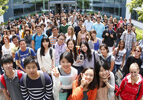 INTERNATIONAL SUMMER COURSE
INTERNATIONAL SUMMER COURSELearning in the land of freedom and narrow lanes
The German language is not difficult and it even can make fun to learn it – this is the motto promoted by Michaela Küper and her team. They welcomed 115 participants from 31 nations at this year's 64th International Summer Course at Johannes Gutenberg University Mainz (JGU), who were eager to discover not only the German language, but also the country.
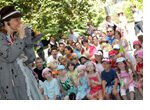 SUMMER FESTIVAL
SUMMER FESTIVALDiscovering the Botanic Garden
On the hottest day of the year, the Botanic Garden of Johannes Gutenberg University Mainz (JGU) held its summer festival. Thousands came to inspect the grounds, attend concerts and the children's theater, meander between couscous and bratwurst, or rush to the popular plant bazaar.
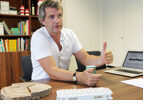 CLIMATE
CLIMATEFinnish trees tell the story of 2,000 years of climate history
Over the past 2,000 years, the climate in northern Europe has cooled more than previously assumed. This is the conclusion drawn by an international group of researchers following the examination of the growth rings of fossilized pines from Finnish Lapland. Scientists from Johannes Gutenberg University Mainz (JGU) also took part in this major project, most notably the climate geographer Professor Dr. Jan Esper.
 NAT-LAB
NAT-LABWearing white lab coats and discovering colors
The NaT-Lab school laboratory at Johannes Gutenberg University Mainz (JGU) has moved to its latest home in the Institute of Physical Chemistry's new building – just in time to undergo its first major field trial: For four days, pupils will be using it to track down dyes. By performing a range of experiments, they will gain completely different insights into chemistry, biology, and physics than they would during normal lessons.
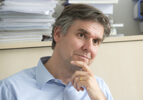 EURO CRISIS
EURO CRISISDon’t panic, we’re still on course
The euro crisis is on everyone's lips and one disaster has hardly had to time to dissipate before the next arrives. Germany is putting up billions, Greece is still sinking despite bailout fund, Spain and Italy are teetering on the edge of the abyss, the financial markets are fluctuating between nervousness and hysteria. Mainz economist Professor Dr. Philipp Harms tries to remain objective in view of the situation.
 MIGRATION SURVEY
MIGRATION SURVEYNo gap between foreigners and Germans
It is no longer possible to clearly differentiate between foreigners and immigrants on the one hand and Germans on the other. These are the preliminary findings of the "Survey of Migration in Mainz" undertaken by the Institute of Geography and the Center for Intercultural Studies (ZIS) at Johannes Gutenberg University Mainz (JGU), in which hundreds of students participated.
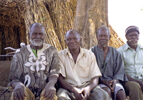 BURKINA FASO AND GHANA
BURKINA FASO AND GHANAArchiving West African settlement history
Anthropologists at Johannes Gutenberg University Mainz (JGU) and Goethe University Frankfurt have documented an extensive record of the settlement history of more than 200 villages in Burkina Faso and Ghana that had previously only been handed down in oral form. The researchers' findings have been presented to the National Archives of Burkina Faso where they represent an important contribution to the long-term preservation of this country's intangible cultural heritage.
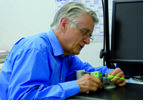 SPONGES
SPONGESOn the trail of an ancient survivor
Sponges have a lot to relate: And Mainz molecular biologist Professor Dr. Werner E. G. Müller has been showing the world exactly what they have to tell us over the past few decades. In an interview he talks about this long underestimated organism, its significance to research, and its potential to help people in so many different ways.
 SOCCER AND FANS
SOCCER AND FANSMainz 05 reinvents itself as a carnival club
What form does regional identity take in an increasingly globalized world? This was the subject of the inaugural lecture of cultural anthropologist Dr. Christina Niem. Her talk was entitled "Regional representation or competing regional identities? Two Rhineland-Palatinate Bundesliga soccer teams in comparison", and she used it to provide an analysis of 1. FSV Mainz 05, 1. FC Kaiserslautern, and their fan clubs.
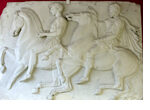 CLASSICAL ARCHEOLOGY COLLECTIONS
CLASSICAL ARCHEOLOGY COLLECTIONSThe action cinema of the ancient world
Powerful ancient masterpieces, detailed paintings on Greek ceramic vessels, and much more are on offer in the cast and original collections of Classical Archaeology division at Johannes Gutenberg University Mainz (JGU). Not only teaching staff but also students are involved with the collections. They jointly develop design concepts and organize exhibitions.
